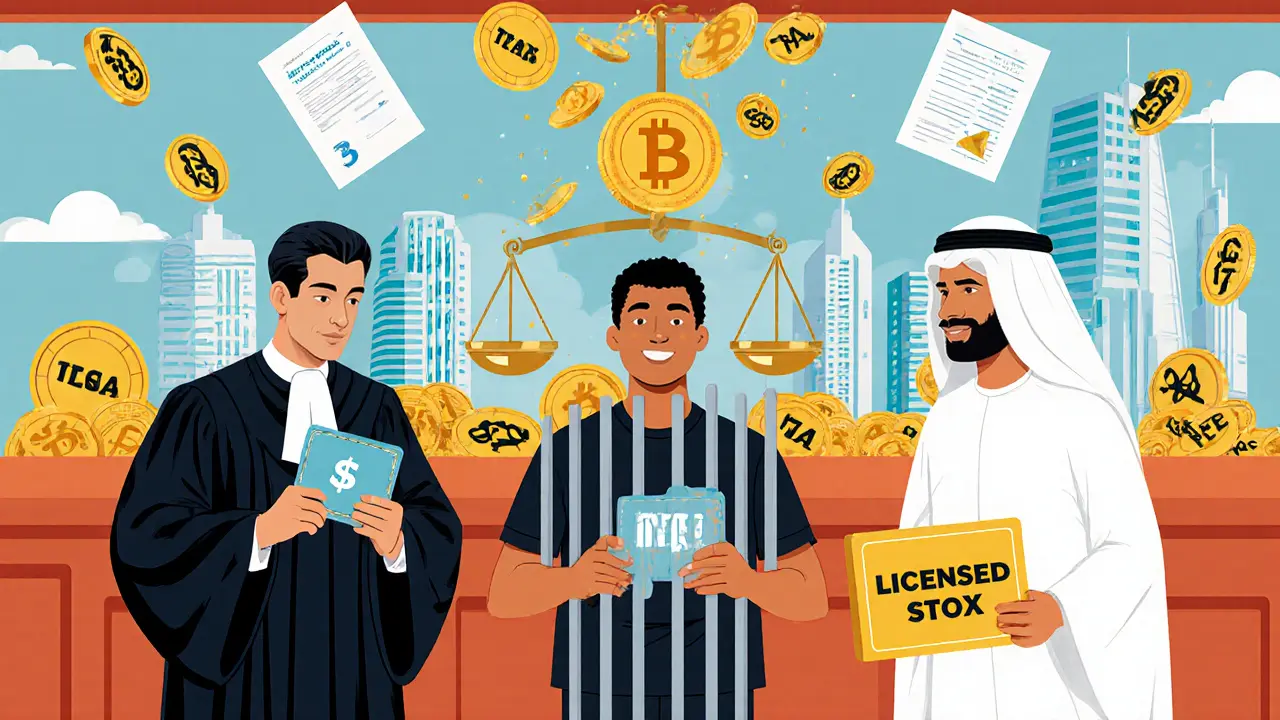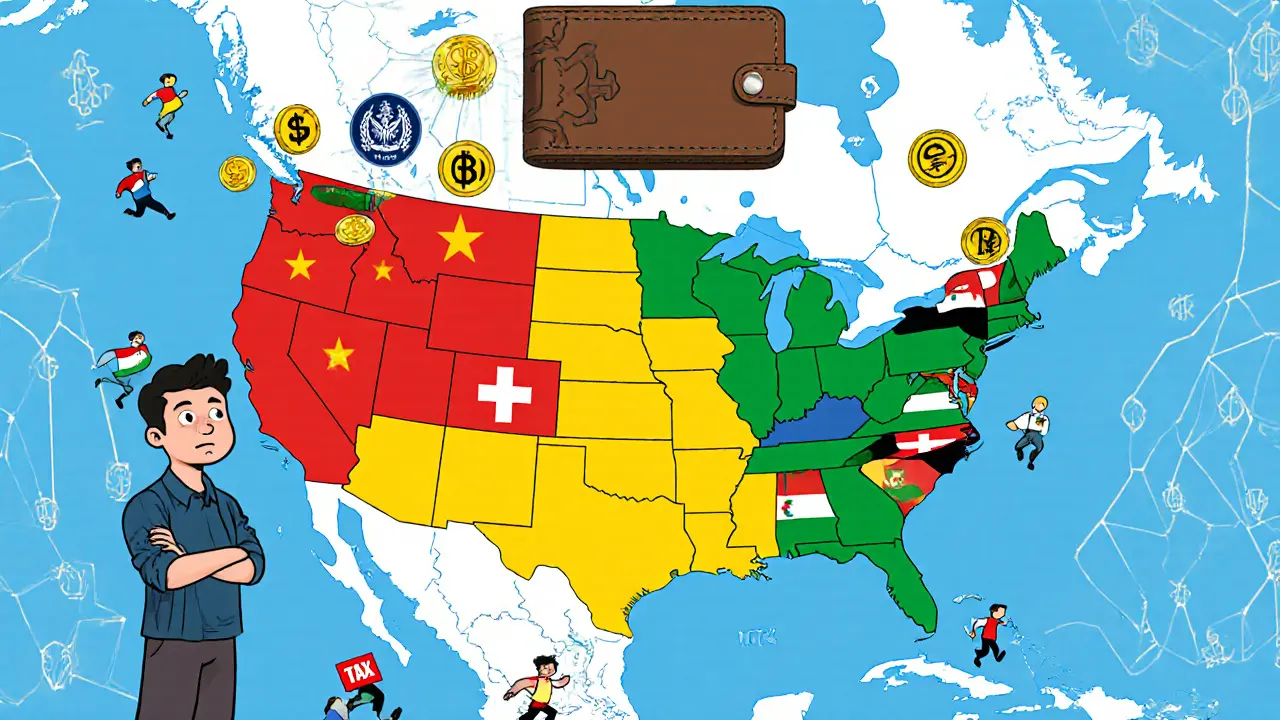Crypto Regulation Checker
Find Your Crypto Regulatory Status
Select your country to see what cryptocurrency activities are legal and regulated in 2025
Regulatory Summary
Key Regulations
- Licensing:
- AML/Travel Rule:
- Tax Treatment:
- Stablecoins:
There’s no such thing as a global crypto rulebook. What’s legal in Switzerland could land you in jail in Algeria. What’s taxed at 0% in Portugal gets hit with a 30% flat rate in India. If you’re holding, trading, or building anything with cryptocurrency in 2025, you must understand your jurisdiction’s rules - or risk fines, frozen assets, or worse.
Why Your Location Matters More Than Your Wallet
Crypto isn’t like cash. You can’t just send it anywhere and assume it’s fine. Every country has its own take on what crypto is - a commodity? a security? a currency? - and how it should be treated. The difference isn’t academic. It’s financial. In the U.S., the SEC says 95% of crypto tokens are securities and must be registered. In the EU, MiCAR treats them as financial instruments with strict licensing. In China, owning crypto isn’t illegal, but trading on exchanges is, and mining is banned outright.And it’s not just about buying and selling. If you’re staking, lending, earning yield, or using DeFi protocols, you’re already operating in a regulatory gray zone in many places. In 2025, over 78% of countries have some form of crypto regulation. That’s up from 52% in 2022. The days of ignoring the law are over.
The Three Types of Crypto Jurisdictions in 2025
Not all countries are created equal when it comes to crypto. You can group them into three buckets:- Restrictive: These countries ban or heavily limit crypto activity. China is the most extreme - no exchanges, no mining, no retail trading platforms. India imposes a 30% tax on gains and a 1% TDS (tax deducted at source) on every transaction. Algeria, Bolivia, and Bangladesh have outright bans with prison terms for violations.
- Neutral: These countries treat crypto like any other financial asset - no special rules, but existing laws apply. The U.S. is the prime example. The SEC, CFTC, IRS, and 50 state regulators all have a say. No single rulebook. Just a messy patchwork of enforcement actions, tax codes, and licensing requirements.
- Crypto-friendly: These nations have built clear, tailored frameworks to attract business. The UAE (ADGM and DIFC), Switzerland (FINMA), Singapore (MAS), Hong Kong, and Canada lead the pack. They offer licensing, tax clarity, and legal certainty. In the UAE, there’s zero capital gains tax. In Switzerland, crypto trading is tax-free if it’s personal, not commercial. In Singapore, you can get a license to operate a crypto exchange in under six months.
If you’re a trader, your jurisdiction decides your tax bill. If you’re a developer, it decides whether your project can launch. If you’re an investor, it decides whether your assets are safe.
What’s Actually Regulated? Four Key Areas
Crypto regulation doesn’t just say “you can’t do this.” It breaks down into four specific areas you need to know:- Licensing for exchanges and service providers: In the EU, under MiCAR, every crypto exchange, wallet provider, or staking platform must be licensed by their national regulator. In the U.S., you need a BitLicense in New York, a money transmitter license in 48 other states, and possibly SEC registration if you’re selling tokens. In Singapore, MAS requires a Payment Services License. Skipping this step? You’re operating illegally.
- Anti-money laundering (AML) and the Travel Rule: The FATF requires all crypto service providers to collect and share sender and receiver info for transactions over $3,000. The EU’s MiCAR enforces this for transactions over €1,000. The U.S. is rolling it out under the GENIUS Act. If you’re using a non-compliant wallet or exchange, your funds could be frozen.
- Tax treatment: This is where most people get burned. The IRS treats crypto as property - every trade is a taxable event. Germany gives you tax-free gains if you hold over one year. Portugal taxes crypto gains at 28% for individuals. India’s 30% tax plus 1% TDS means you lose 35.4% on a 20% gain. Keep records. File. Don’t assume your exchange sends you a 1099 - most don’t.
- Stablecoin rules: The biggest regulatory push in 2025 is around stablecoins. The U.S. passed the GENIUS Act in July 2025, requiring 1:1 backing with U.S. dollars or Treasury bills, monthly audits, and public transparency reports. The EU’s MiCAR already does this. If you’re holding USDT, USDC, or any stablecoin, know who issued it - and whether they’re compliant. Non-compliant stablecoins are being delisted from major exchanges.

Real-World Consequences: What Happens When You Ignore the Rules
Regulation isn’t theoretical. People are losing money - and freedom - because they didn’t check their local laws.In Europe, after MiCAR went live in December 2024, Binance and other exchanges stopped offering staking for 23 tokens. One user lost €1,850 in annual yield overnight. In India, crypto traders report net losses of over 35% on modest gains after taxes. In the U.S., Coinbase spends $120 million a year just to comply with state-level rules - that’s 8.7% of their operating costs.
And it’s not just about money. In Algeria, you could face 2-5 years in prison for trading crypto. In Bangladesh, using crypto is illegal under the Money Laundering Prevention Act. Even if you think you’re anonymous, regulators are tracking on-chain activity. In 2025, blockchain analytics firms like Chainalysis and TRM Labs work directly with law enforcement in over 90 countries.
How to Find Out What’s Legal in Your Country
You don’t need a law degree to figure this out. Here’s how to do it in five steps:- Identify your jurisdiction: Are you a resident? Citizen? Just traveling? Your tax and legal obligations follow your residency, not your passport.
- Check your central bank’s website: Most countries have a financial regulator - like the SEC in the U.S., MAS in Singapore, or FSCA in South Africa. Search for “crypto regulations [your country].”
- Look for official guidance, not news: News sites report enforcement actions. Regulators publish rules. Look for PDFs, legal notices, or licensing portals.
- Use trusted sources: The IMF, FATF, and World Bank publish country-by-country regulatory summaries. PwC’s 2025 Crypto Regulation Report and Chainalysis’ 2025 Global Adoption Index are reliable.
- Ask a local professional: If you’re holding more than $10,000 in crypto, hire a tax advisor or lawyer who specializes in digital assets in your country. It’s cheaper than a penalty.

What’s Coming in 2026? The Next Wave
Regulation isn’t static. In 2025, the EU is drafting MiCA II to cover DeFi and NFTs. The U.S. is pushing for a federal stablecoin charter. South Africa is finalizing its CBDC and trying to get off the FATF gray list. The Basel Committee is set to update its crypto risk weights by the end of 2025.By 2026, 92% of the world’s population will live under some form of crypto regulation. The countries that win are the ones that get it right - clear rules, low friction, tax certainty. The ones that lose? They’ll see innovation flee to places like Dubai, Singapore, or Zug, Switzerland.
If you’re in a restrictive country, you might still use crypto - but you’ll be doing it on peer-to-peer platforms, with higher risk and no recourse. If you’re in a crypto-friendly jurisdiction, you can build, trade, and invest with confidence.
The message is simple: Crypto doesn’t care about borders - but the law does. Know where you are. Know what the rules are. And don’t assume someone else will tell you.
Is it legal to own cryptocurrency in my country?
It depends. In most countries, owning crypto is legal - but what you can do with it isn’t. For example, in the U.S., you can own crypto, but trading certain tokens may violate SEC rules. In China, owning crypto isn’t illegal, but using exchanges or mining is. In Algeria and Bolivia, owning or trading crypto is banned outright. Check your country’s central bank or financial regulator for the official stance.
Do I have to pay taxes on my crypto gains?
Almost always, yes. In the U.S., Canada, Germany, and most of Europe, crypto is treated as property. Every time you sell, trade, or spend it, you trigger a taxable event. India taxes crypto gains at 30% flat, plus 1% TDS on every transaction. Portugal taxes gains at 28%. Only a few places, like Singapore and the UAE, don’t tax personal crypto gains. Always track your transactions - exchanges don’t always report to tax authorities.
Can I use a U.S.-based exchange if I live abroad?
You might be blocked. Most major U.S. exchanges like Coinbase and Kraken restrict access based on your IP address and residency. Even if you can sign up, you may not be able to deposit, withdraw, or trade certain assets. Using a VPN to bypass restrictions violates their terms and could lead to account freezes or legal trouble if your country bans foreign exchanges.
What happens if I don’t report my crypto to the tax authorities?
You risk audits, penalties, interest charges, or even criminal charges. The IRS, HMRC, and other tax agencies now have direct access to data from major exchanges and blockchain analytics tools. In 2024, the IRS collected over $1.2 billion in crypto-related taxes through audits. In the UK, HMRC has sent out 110,000 letters to crypto holders suspected of underreporting. Ignoring it isn’t an option anymore.
Are NFTs regulated like other crypto assets?
It’s still unclear in many places. In the U.S., the SEC says NFTs can be securities if they’re sold as investments with promises of profit. In the EU, MiCA II (expected in 2026) will likely bring NFTs under licensing rules if they’re used for fundraising or trading. In Singapore, NFTs are treated as digital tokens if they have utility or investment features. If you’re minting or selling NFTs, assume they’re regulated - and get legal advice.
Which countries have the easiest crypto rules for beginners?
For individuals, the easiest places are Portugal (no capital gains tax on personal crypto), Germany (tax-free after one year), Singapore (clear rules, no tax on personal trading), and the UAE (zero tax, licensed exchanges). These countries offer legal clarity without heavy compliance burdens. Avoid places like India (high tax), China (no exchanges), or Algeria (banned) if you want to trade without stress.

8 Comments
bro i just bought some solana last week and thought i was being smart but then i saw india’s 30% tax and nearly threw my laptop out the window. why does everything have to be so complicated??
you’re not smart you’re just lucky you haven’t been audited yet. if you don’t track every single trade you’re already in trouble. no excuses.
the real issue isn’t the laws it’s the lack of clarity. why should i have to hire a lawyer just to know if i can stake my eth? crypto was supposed to be freedom not bureaucracy with more paperwork than the irs. we need unified global standards not 200 different rulebooks. the tech is ready the institutions are the problem.
if you’re new to this and feeling overwhelmed just start with one thing: use a tax tool like koinly. it’s not perfect but it’ll save you from a nightmare later. also if you’re in the us and using coinbase they’ll send you a 1099 for most stuff. don’t panic just get organized.
why are we even talking about this like it’s normal? the u.s. is the only country that matters here. if you’re not using a u.s. exchange you’re playing with fire. and if you’re in india or algeria you’re already breaking the law so why are you even here?
so i live in texas and use binance but i dont think they let me trade usdt anymore? idk i just use my phone and dont think too hard about it. i got like 12k in btc and i just hold. sometimes i feel bad not reporting but then i remember the irs is just a bunch of people in suits who dont even know what a blockchain is. also i use a vpn and its chill. lol
you people are hilarious. you think you’re crypto rebels but you’re just tax dodgers with a wallet. if you need a 300 dollar consult to know what to do you shouldn’t own crypto. get a job.
While the post outlines jurisdictional differences accurately, it overlooks the human impact of regulatory fragmentation. Consider the expat living in Singapore with assets in the U.S. and family in India-how do they reconcile conflicting tax obligations? The burden falls disproportionately on individuals who lack legal resources, not institutions. Regulatory clarity should prioritize accessibility, not just compliance. A 30-minute consultation shouldn’t be a luxury for those holding under $10,000. The system is designed to protect capital, not citizens. We need public education initiatives, not just PDFs buried on central bank websites.